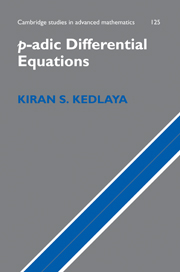Book contents
- Frontmatter
- Contents
- Preface
- 0 Introductory remarks
- Part I Tools of p-adic Analysis
- 1 Norms on algebraic structures
- 2 Newton polygons
- 3 Ramification theory
- 4 Matrix analysis
- Part II Differential Algebra
- Part III p-adic Differential Equations on Discs and Annuli
- Part IV Difference Algebra and Frobenius Modules
- Part V Frobenius Structures
- Part VI Areas of Application
- References
- Notation
- Index
1 - Norms on algebraic structures
Published online by Cambridge University Press: 05 August 2012
- Frontmatter
- Contents
- Preface
- 0 Introductory remarks
- Part I Tools of p-adic Analysis
- 1 Norms on algebraic structures
- 2 Newton polygons
- 3 Ramification theory
- 4 Matrix analysis
- Part II Differential Algebra
- Part III p-adic Differential Equations on Discs and Annuli
- Part IV Difference Algebra and Frobenius Modules
- Part V Frobenius Structures
- Part VI Areas of Application
- References
- Notation
- Index
Summary
In this chapter, we recall some basic facts about norms (absolute values), primarily of the nonarchimedean sort, on groups, rings, fields, and modules. We also briefly discuss the phenomenon of spherical completeness, which is peculiar to the nonarchimedean setting. Our discussion is not particularly comprehensive; the reader new to nonarchimedean analysis is directed to [191] for a fuller treatment.
Several proofs in this chapter make forward references to Chapter 2. There should be no difficulty in verifying the absence of circular references.
Convention 1.0.1. In this book, a ring means a commutative ring unless commutativity is suppressed explicitly by describing the ring as “not necessarily commutative” or implicitly by its usage in certain phrases, e.g., a ring of twisted polynomials (Definition 5.5.1).
Notation 1.0.2. For R a ring, we denote by R× the multiplicative group of units of R.
Norms on abelian groups
Let us start by recalling some basic definitions from analysis, before specializing to the nonarchimedean case.
Definition 1.1.1. Let G be an abelian group. A seminorm (or semiabsolute value) on G is a function | · | : G → [0,+∞) satisfying the following conditions.
(a) We have |0| = 0.
(b) For f, g ∈ G, |f − g∈ ≤ |f| + |g|. (Equivalently, |g| = |−g| and | f + g| ≤ | f| + |g|. This condition is usually called the triangle inequality.)
We say that the seminorm | · | is a norm (or absolute value) if the following additional condition holds.
- Type
- Chapter
- Information
- p-adic Differential Equations , pp. 13 - 34Publisher: Cambridge University PressPrint publication year: 2010

